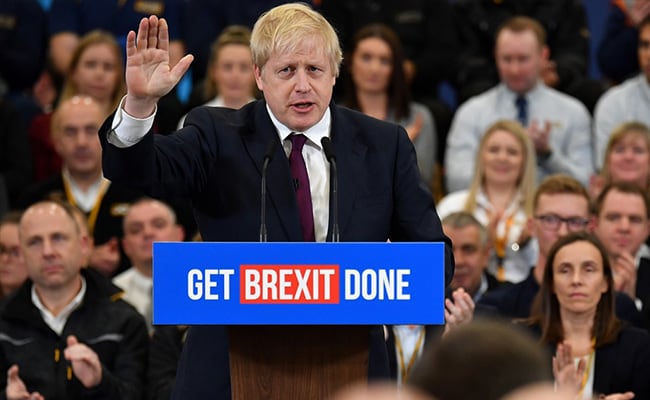Boris Johnson's election gamble has paid off. What he wanted above all was a comfortable majority in parliament - and that he now has. Which means it's just about certain that Johnson will now lead Britain out of the European Union, as he has repeatedly promised, by the end of next month.
The results have been much more emphatic than most observers expected: this election is the first in 14 years to return a government with a commanding parliamentary majority; the Conservatives are set to return more MPs than in any election since 1987; the opposition Labour Party's performance could well be its worst in more than 80 years.
Quite a few results have still to be announced, but it seems that the Conservatives will have almost twice as many seats in the new parliament as Labour, and will enjoy a very comfortable majority over all other parties of about 60.

Boris Johnson said that voters had given his government a "powerful new mandate" to take Britain out of the EU next month, as he headed for victory in a landmark election
The Conservatives' slogan of 'Get Brexit Done' chimed with Britain's voters. Even many opponents of Brexit are fed up of the continuing uncertainty so long after the June 2016 referendum which delivered the surprise vote to leave the European Union.
The pound rose sharply on the currency markets as the scale of the Conservatives' victory became apparent - not because the markets welcome Britain's departure from the EU, which is likely to dampen economic growth, but because of the prospect of political stability and an end to the paralyzing confusion over Brexit.
For many voters, big questions remain about Boris Johnson's character and leadership. But he has, against expectations, managed to renegotiate the terms of Britain's departure from the European Union, largely banishing the prospect of a chaotic 'no deal' exit. And he has emphasized his willingness to put more money into Britain's state-funded health service and to draw a line under the policy of austerity which has starved public services of money.

Demonstrators wave European Union flags and hold placards as they protest outside Downing Street in London
Boris Johnson had another clear advantage - the deep unpopularity of Labour's left-wing leader, Jeremy Corbyn, who is seen as an extremist, profligate in his spending plans and unconvincing as a potential Prime Minister. Corbyn has expressed his deep disappointment with the outcome and said he will not lead the party into another election - a battle is looming for control of the Labour Party between centrists and leftists.
The smaller parties have also fared badly. The centre Liberal Democrats, the most determinedly pro-Europe party, ran a lacklustre campaign. Its young and inexperienced leader, Jo Swinson, is struggling to retain her own seat in parliament. And on the right, Nigel Farage's nationalist Brexit Party, which won more votes than any other party in Britain's elections to the European Parliament as recently as May, has made next-to-no impact. When Boris Johnson campaigns so loudly for Brexit, there's no space left for an even more Eurosceptic party.
This was Britain's third general election within five years and although it has been described as the most important electoral contest in a generation, the campaign was flat and uneventful. Many voters were suspicious of both main parties and the promises they made. In the judgment of the Financial Times: "The gulf in trust between the public and the political class has never yawned so wide."

An exit poll pointed to a Conservative majority of 86, the best result since Thatcher was in Downing Street in 1987
Boris Johnson will now have to press ahead not just with Britain's formal departure from the European Union but also - much more difficult - negotiate the details of Britain's enduring trade arrangements with its principal commercial partners in the EU. He has set himself the very challenging target of completing these talks by the end of 2020.
Another challenge he will face is in Scotland where the pro-independence Scottish National Party has increased its political dominance and will argue that this is a mandate for Scotland to leave the United Kingdom and remain in the EU. A constitutional clash there is looming.
The outcome of Britain's election will be keenly watched in the United States which is on the cusp of an election year. Jeremy Corbyn's dismal failure will be taken as a warning to the Democrats that a determinedly left-wing candidate such as Bernie Sanders or Elizabeth Warren may face an uphill task in challenging a populist, right-wing incumbent.
(Andrew Whitehead was a political correspondent and an India correspondent during his 35-year career with BBC News.)
Disclaimer: The opinions expressed within this article are the personal opinions of the author. The facts and opinions appearing in the article do not reflect the views of NDTV and NDTV does not assume any responsibility or liability for the same.


